- Home
- Pat Barker
The Women of Troy: A Novel Page 7
The Women of Troy: A Novel Read online
Page 7
The momentary spurt of confidence enables him to sit up and look around. As always, the room seems to shrink away from him. It’s extraordinary how alive these things are. The lyre, lying there as if Achilles had only just put it down; the mirror that had once held his reflection, but is now black; his shield propped up against the wall. All these things are his now, but they don’t feel like his. He can’t play the lyre, and he certainly isn’t going to let anybody else play it. He can, and does, polish the shield. The mirror plays tricks. Sometimes he puts on Achilles’s armour and stands in front of it, but his reflection doesn’t always move when he moves. He’s becoming detached from himself.
Enough. The only solution is to get out. He pulls on a clean tunic, thrusts his feet into sandals and bangs out of the hut. The wind snatches his breath, slams the door behind him, almost as if it’s locking him out. Where to go? Nobody’s up. The late-night-drinking session in the hall will have everybody groaning and nursing their sore heads much as he’s been doing; apart from a few women stoking fires and grinding corn, the camp’s deserted. The sea, then. He follows the path through the dunes, aware every time he puts a foot down that he’s treading where great Achilles trod. Literally, there’s nowhere on the beach or in the camp that he can stand without knowing that Achilles stood there before. Nothing he can touch: the table, the cup, the plates at dinner…Nothing. And, of course, it’s a comfort to have his father so close. Except he isn’t. He’s not here at all. Coming out onto the beach, Pyrrhus experiences the vast expanse of sea and sky as one unbearable, aching absence.
Swim. As once Achilles swam—every morning, every night. But the sea’s a wall of brown, churned-up sand. Even the thought of plunging into that makes him feel sick, but he’s got to do it—there’s no choice. There’s never been a choice. So, he wades in; feels ice-cold water slap against his knees, sand slip away between his toes. The next wave slops into his groin, his chest, his mouth and then he’s swimming, his head and tense neck raised above the waves. He tries to put a foot down, but there’s no ground beneath his feet, and so he has to go on through the bubbling foam into the quieter space beyond, though even here the swells are tipped with white and seethe along their crests. A few more yards of shameful doggy paddle, becoming ever more frantic as the waves threaten to carry him away, and then he’s ready to come out. Half walking, half crawling through the shallows, he feels no sense of achievement. The sea swallowed him; the sea’s spewed him back, that’s all.
Achilles, as Pyrrhus has been told over and over again, swam like a seal, as if the sea were his real home. Once, he’d stayed underwater so long that Patroclus ran into the sea to rescue him, only to see him surface a couple of hundred yards further out. That scene’s one of the clearest images he has of his father: a man swimming far out to sea, another waiting anxiously on the shore. Now, for the first time, it occurs to him that the scene makes no sense. What had Patroclus been anxious about? The strongest swimmer in the Greek army, swimming in a calm sea?
There are so many things he doesn’t understand.
Slowly, he puts on his damp tunic, pushes his feet into gritty sandals and turns to look at the camp. One or two lights in the huts now, but he has no desire to go back. He’s better off out here, with the wind scouring his mind clean of the night’s tawdry memories. Not her fault, poor cow. Not her fault at all. If only it wasn’t so cold. If only the wind would stop. And at that very moment, just as the thought forms, there’s a lull.
Silence. Nothing moves, not even a blade of grass. All over the camp, men who’ve slept soundly through the raging of the storm, will be awake, staring at each other. Is this it? Has it stopped? Can we go home? But before they even have the chance to speak, the wind starts picking up again; at first no more than a cat’s-tail twitching of dead leaves and grass, but then with greater and greater force, till it’s sweeping off the sea with every bit as much power and venom as it had before.
These unpredictable lulls, when, for a brief moment, leaving, going home, begins to seem possible, sap morale more than the worst blasts of the storm. And every time it happens, the common-sense view that the wind means nothing, that it’s just, to use Machaon’s contemptuous word, weather, loses ground a little. Because, in the aftermath of one of these lulls, it really does feel as if the gods are playing with them, holding out hope on an open palm only to snatch it away.
Pyrrhus feels his wet hair lift from the nape of his neck, feels his damp tunic being moulded yet more closely to the contours of his body, and trudges on. A hot bath? A bowl of stew? Last night’s leftovers, but stews sometimes taste even better the second day. Or a visit to the stables? See Ebony, help the grooms turn the horses out to pasture. No, none of those things. Not now.
All the time he’s been pretending to think about hot baths and food, his feet have been leading him to where he needs to be. He’s reached the place now. Fingers pinching his nose, breathing loudly through his mouth, he follows the path until he sees what lies stretched out on the dirty sand. He needs this. He needs to confirm what he already knows, that the tongue that said those words—which he will not let himself repeat, no, not even in the buzzing vacancy of his own mind—is rotting now, inside a rotting skull. He stands, stares, takes in every minute detail, notices every change.
Enough. He won’t need to come here again, possibly not for several days, but he will be back. Because this is his proof that he is who he claims to be: the man who killed King Priam. Great Achilles’s son. The hero of Troy.
9
I thought about Priam a great deal over the next few days. Seeing his ring round Andromache’s neck brought everything back. There was nothing I could do to prevent the dishonouring of his body, but at least I could visit his widow, Hecuba, and perhaps make her life more comfortable in some small way. So, one morning, I set off to see her, taking Amina with me. I could have taken one of the other girls, but I thought the walk might give me a chance to talk to her. I was still concerned about her; she seemed unable to accept the reality of her situation. In fact, she was steadily and dangerously defiant. But there was no possibility of speaking to her on our way to the arena. The wind was so strong it made speech impossible. I had to walk head down, muffled in my veil, while Amina trailed obstinately behind.
A group of men was raking the sand on the arena floor. Alcimus’s idea of holding competitive games was proving popular and many of the events were to be held there. I stopped to watch them work, noticing little piles of offerings at the feet of the gods’ statues: fruit, big bunches of purple daisies, as well as other more eccentric gifts: models of shields and spears, a pair of new sandals, a child’s toy horse. Looking around the circle, I saw that some gods—Athena, in particular—were doing better than others and I realized this was a visual guide to what ordinary Greek fighters were thinking. Why are we being kept here on this bloody awful beach? Which god have we offended? Answer—or at least best guess: Athena. And why Athena? Because it was in her temple that Cassandra had been raped, and the rapist, Ajax the Lesser—Little Ajax—had not been punished as he ought to have been, which arguably made Agamemnon and the other kings complicit in his crime. Of course, it wasn’t the rape that bothered them; it was the desecration of the temple. That was a violation Athena might well be inclined to avenge.
Amina was staring at the piles of offerings, her eyes darting from one statue to the next. I wondered what she made of them. They must have been splendid when they were first erected, but they’d fallen into a state of dilapidation over the years: rotten bases, flaking paint. Artemis, the Lady of Animals, goddess of hunting, was in a particularly bad state: her features half erased, barely a trace of paint left on her robes.
Since I was there, I thought I’d visit Hecamede, Nestor’s prize of honour and, after Ritsa, my closest friend in the camp. I found her sweeping the hall, a stack of fresh rushes by the door waiting to be laid, though, as she pointed out after we’d hugged each other,
the hall scarcely needed cleaning. There’d been no celebratory feasts in Nestor’s hut; his youngest son, Antilochus, had been killed in the final assault on Troy. Antilochus: the boy who’d loved Achilles. His death had plunged the whole compound into mourning. You felt the stricken atmosphere the moment you stepped over the threshold of the hall—the loss of a young, promising life. Amina lingered by the door; I perched on a bench with my feet raised while Hecamede finished sweeping, then helped her lay the rushes.
“How’s Nestor?” I asked.
She pulled a face. “Not good.”
I couldn’t believe Nestor was really ill. He was like an ancient tree that bends in every gale—you think at any moment it’s going over, but next morning there it is, still standing, surrounded by acres of healthy saplings uprooted in the night. Though I could see why this illness, whatever it was, might be preying on Hecamede’s mind. If Nestor died, what would become of her? If she was lucky, one or other of his surviving sons might take her, though sons don’t normally inherit their father’s concubines; more likely, she’d be awarded as a prize in Nestor’s funeral games. Exactly what would have happened to me if Achilles hadn’t given me to Alcimus.
We finished laying the rushes and sat on one of the benches. There was a smell of burnt sugar and cinnamon and further along the table were two trays of small cakes, scarcely more than a mouthful each, but utterly delicious. The popular name for them was “come-again cakes,” because nobody ever managed to stop at one. “Can’t be much the matter with him if he’s eating those.”
“Oh, they’re not for him—they’re for Hecuba. I was just going to take them across if you’d like to come?”
“Yes, of course. I was on my way to see her anyway. I just couldn’t resist coming to see you first.”
“Good, we can go together. I’ll just need to check on Nestor first.”
Apparently, he’d been talking of sitting out on the veranda, but when we put our heads round the door, we found him asleep—snoring loudly, his upper lip pouting on every breath. Even at this distance, I could see his nose and lips were blue. “It’s the sharpness I don’t like,” Hecamede said, touching the tip of her own nose. “They get like that before they go.”
It was a relief to leave the room, with its smell of old, sick flesh. Outside, in the hall again, I took several deep breaths. Then, Hecamede picked up one tray, I took the other, and with Amina lagging as usual several yards behind, we set off across the arena where long shadows cast by the gods’ statues slanted over the freshly raked sand. Dazzled, we moved from light to shade to light again—a short, brisk walk in the gritty wind—and then, ducking our heads, emerged into the frowsty darkness of Hecuba’s hut. One sickroom to another, I thought. There the resemblance ended: Nestor slept in a king’s bed surrounded by all the trappings of wealth and power; Hecuba’s hut was more like a dog kennel than a human habitation. Though at least she had it to herself—a rare luxury in that overcrowded camp. Odysseus did seem to be treating her reasonably well. When the royal women were shared out among the kings, there’d been a lot of joking at Odysseus’s expense. Agamemnon and several of the other kings had got Priam’s virgin daughters, Pyrrhus a sprightly young widow—plenty of go in that one, if she’d only cheer up a bit—whereas Odysseus was left with a scraggy old woman. Odysseus just shrugged, brushing the laughter aside. He knew he’d be taking home the only woman his wife, Penelope, would have accepted—and, with any luck, he might be able to convince her that he’d slept alone for the last ten years with nothing to while away his lonely evenings beyond the occasional game of skittles with his men. He was clever enough to make it sound convincing—and, from all accounts, Penelope was quite clever enough to pretend to believe it. Everybody you spoke to praised Penelope’s wit and kindness. I could easily imagine Hecuba sitting in a warm room doing light embroidery and not, as so many older women were forced to do, scrubbing stone floors while being shouted at because they weren’t working fast enough. Oh, it might be a life of misery, ravaged by grief, but at least she’d be physically comfortable, for however many weeks or months she might have left.
All nonsense, these imaginings. Hecuba never, from the minute she saw Priam killed, intended to live.
At first sight, she was a bag of bones, huddled under a dirty blanket. The one arm lying outside the cover was so wrinkled and brown-spotted it looked more like the pelt of an animal than human skin. She stirred when she heard our voices and started trying to sit up, blinking in the sudden light. I was horrified to see how frail she’d become; even in the short time since her arrival in the camp, she seemed to have shrunk. I wondered how much she was eating. Hecamede touched her feet and offered the tray of cakes. Hecuba thanked her profusely, but immediately set it aside and peered up at me.
“This is Briseis,” Hecamede said.
I too knelt and touched Hecuba’s feet. I didn’t expect her to remember me. We’d met often enough during the two years I’d spent in Troy, but I’d been a child then. I must have changed out of all recognition since—and she did look puzzled for a moment, but then reached up and laid one thin hand on the side of my face. “I want to thank you, my dear.”
“Why? Hecamede baked the cakes.”
“You were kind to Priam when he went to see Achilles. He remembered you, he remembered Helen bringing you to the citadel. ‘Helen’s little friend.’ You must have been quite a child back then?”
“I was twelve.”
“He talked about you when he came back. He said you’d been kind.”
I couldn’t speak, I was so close to tears.
“Well, well.” Hecuba patted my arm. “Let’s have some cakes.” She was peering into the shadows where Amina stood, ostentatiously obliterating herself, as usual. I realized Hecuba couldn’t see very well.
“Amina?” I said.
She came forward then, knelt and touched Hecuba’s feet. To my surprise, Hecuba said, “Amina. My poor child. How are you?”
“All right.”
“You were given to Pyrrhus?”
“Yes—not what I’d have chosen…”
Hecuba made a curious sound midway between a snort and a laugh. “No, well, I think choice is a thing of the past.”
Hecamede handed round the cakes while I poured the wine. Hecuba was too excited to eat, though I noticed she drank rapidly. Well, let her drink. In her position, I’d have drunk the sea dry. Within minutes there were two red spots on her cheeks, contrasting garishly with the general greyness of her skin and hair. At first, she concentrated solely on the wine, but then she began to talk about Helen. Did we know Menelaus was sleeping with her again? She had a whole hut to herself—“not like this, three rooms!”—maids to wait on her, pick up after her. Oh, and a loom. Helen weaving again, like a spider waiting for the vibration that would tell her another fly had landed. Another victim sucked dry…Oh, the hatred in Hecuba’s voice as she spoke of these things. I wondered how she knew about the loom, but gossip flew round that camp—and of course Helen’s maids would be Trojans. Probably it all came from them. They’d be pressing their ears to the wall to hear Menelaus’s grunts, Helen’s ecstatic cries…And there’d be plenty of ecstatic cries; Helen was no fool. The whole camp resented his taking her back. Greek fighters and Trojan slaves united in one thing and one thing only: hatred of Helen. Menelaus had sworn so many times he was going to kill her—the minute he set eyes on her again! Then, that he was going to take her back to Argos and let the women stone her to death—and there’d have been no lack of volunteers. So many widows, so many women who’d lost sons…And yet there he was, back in bed with her. “All night,” Hecuba said. “What’s he trying to do—fuck her to death?”
I think I may have been shocked; I didn’t know Hecuba as well then as I did later.
“Oh, and the lies she comes out with! She was raped—my son raped her? She couldn’t get enough of him! Oh, and saying we kept her a p
risoner in Troy. Nothing of the sort; she could’ve gone home any time she liked. Who did she think wanted her there? My idiot son—nobody else! Any one of my girls would have taken her across the battlefield if she’d been too frightened to go on her own. I’d have taken her.”
And you could see it was true: she was dauntless. All this time, her mouth had been working constantly—even after she’d finished speaking, she actually had to pinch her lips together to keep them still. She looked like a frail, gaunt old bird—a storm thrush, perhaps—feathers ruffled by the blast, but still singing, still shouting defiance from its perch. I was struggling to understand her. Every day, I saw how erased by grief Andromache was—and I suppose I’d expected Hecuba to be the same, or worse. But she was nothing like that. Hatred of Helen consumed her. Perhaps she felt the kings were too powerful, too intimidating, to hate—or perhaps she’d always blamed women and exonerated men. Some women are like that. But it was making me rebellious.
I said: “You can’t just blame Helen! It wasn’t Helen who killed Priam—it was Pyrrhus. And who threw Hector’s son off the battlements? Pyrrhus. And who sacrificed Polyxena? Not Helen—Pyrrhus.”
“And what are you going to do about it?” Hecuba asked.
Silence. I had no answer to that. I knew Pyrrhus was far beyond our reach. Instead, I looked around the walls of the hut, and I just wanted to be outside, filling my lungs with clean air—if you could call that scouring wind with its whipped-up grains of sand “clean.” I wanted to be away from the stale smell that emanated from the dirty blankets on her bed; above all, I wanted not to have to hear that incessantly ranting, exhausted voice; and yet, at the same time, I felt pity for her, and a kind of awe.

 Border Crossing
Border Crossing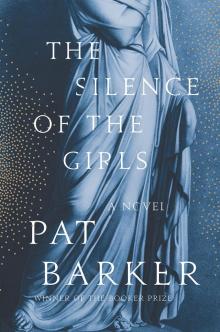 The Silence of the Girls
The Silence of the Girls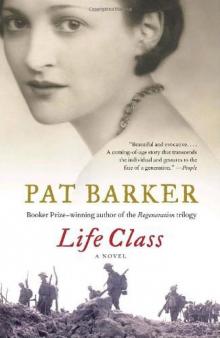 Life Class
Life Class Regeneration
Regeneration Another World
Another World The Ghost Road
The Ghost Road Double Vision
Double Vision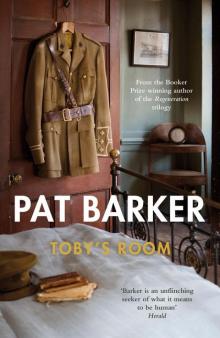 Toby's Room
Toby's Room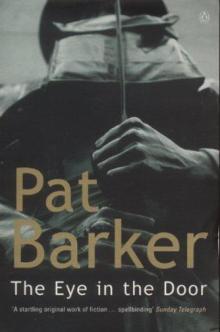 Regeneration Trilogy 02 - The Eye in the Door
Regeneration Trilogy 02 - The Eye in the Door The Eye in the Door
The Eye in the Door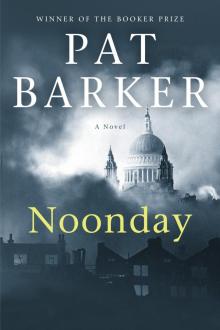 Noonday
Noonday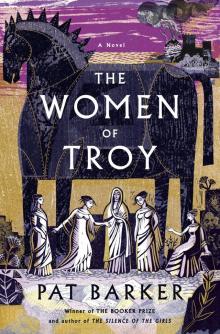 The Women of Troy: A Novel
The Women of Troy: A Novel